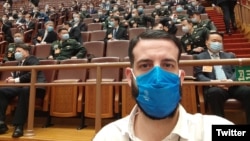Tensions increased between one of Spain’s largest newspapers and China this month, when police in Beijing visited the home of one of the media outlet’s correspondents.
The Spanish daily ABC and its reporter Jaime Santirso both described the incident as “veiled intimidation.”
In a tweet thread on March 8, Santirso said that three members of the police visited his Beijing home on the eve of the National People's Congress, the most important political event of the year in China.
Beijing has pushed back on ABC’s coverage in recent months, with its embassy in Madrid publicly condemning a series of articles and China’s Foreign Ministry late last year summoning the ABC bureau chief to complain about his reporting. Access to the ABC website has been blocked in China since last year.
Santirso and ABC declined to speak with VOA. But their experiences reflect the increasing challenges foreign media face in Beijing, according to media bodies, including the Foreign Correspondents’ Club of China and the International Federation of Journalists, or IFJ.
The IFJ condemned the "wolf warrior diplomacy" employed by China toward Spanish journalists and said the country shows a well-known pattern of intimidation toward foreign media.
Taken from a film, “wolf warrior diplomacy” refers to a more aggressive approach adopted by some Chinese officials.
"The IFJ has documented a clear pattern of harassment or intimidation of journalists from countries that do not follow in step with China's line, particularly on any sensitive topics. It is this type of intimidation that has forced other correspondents to leave their posts or relocate," Jane Worthington, IFJ’s regional director, told VOA.
"Wolf warrior diplomacy and pressure from the state, combined with outright blocking like this, is part of a strategy to control the media narrative and attack foreign journalists' independence," Worthington added.
READ ALSO BY VOA'S POLYGRAPH:
How China’s State Media Smears Free Chinese Journalists
Santirso was not at home when the police visited. But on Twitter he said they spoke with his wife.
“Very kindly, they [the police] said that they wanted me to do balanced coverage of the [congress], with not only bad news but good news. A while later, they left,” Santirso said in a Twitter thread.
“This episode, a police raid in the private home of a journalist with the explicit purpose of influencing the tone and content of his work, is by no means a common practice and no other colleague has experienced something similar recently,” Santirso tweeted.
As a journalist and Beijing resident for eight years, Santirso said he has had several interactions with authorities and security forces over the years, “the vast majority of them have been cordial.”
“This in its way, was, too. At its heart, however, was a veiled intimidation!” he added.
Back in Spain, ABC responded to the incident in an editorial.
“This veiled intimidation, with the explicit intention to influence the tone and content of [Santirso’s] reporting, represents a worrying advance in the hostility toward international media by the Chinese government,” the editorial read.
It was not the first brush between the Spanish paper and the Chinese government.
In November, China’s Foreign Ministry summoned ABC bureau chief Pablo Diez. Officials wanted to correct some “errors” in a profile about President Xi Jinping.
Diez, who did not want to comment to VOA for this article, had described China in the piece as a “dictatorship.”
Around the same time, he wrote an article about tennis player Peng Shuai and other celebrities whom he said disappeared after falling out with or criticizing the Chinese government.
Peng disappeared from public after accusing Zhang Gaoli, China's former vice-premier under Xi, of sexual assault in a November post to the social media platform Weibo. The post was taken down minutes later. Zhang did not publicly comment on the allegations.
In an interview with a French sports magazine in February, Peng denied saying anyone had assaulted her and said she removed the Weibo post herself.
The Chinese Embassy in Madrid published criticism of the ABC articles on its website, in which it named Diez, and said his articles were “full of ignorance, bias and lies.”
The embassy said that Diez’s reporting is “unscrupulously discrediting China and its leader, seriously violating the basic principles of journalism, such as objectivity and neutrality, and misleading the Spanish people about China.”
Shortly after the articles were published, access to ABC’s website was blocked in China.
VOA tried to contact the Chinese Embassy in Madrid for comment, but its calls went unanswered.
The Spanish Foreign Ministry is said to have complained to China’s embassy in Madrid and Foreign Ministry in Beijing about the criticism, sources familiar with the case told VOA.
Spain’s Foreign Ministry did not respond to VOA’s request for comment.
Chinese officials overseas are known to call journalists and media outlets to complain about coverage, media rights groups say.
A report by the Foreign Correspondents’ Club of China in 2021 also found that international journalists are facing “unprecedented hurdles” because of Beijing's efforts to block and discredit independent reporting.”
“As the number of journalists forced out by the Chinese state grows due to excessive intimidation or outright expulsions, covering China is increasingly becoming an exercise in remote reporting,” the report said.
Journalists also are at risk of arrest. Haze Fan, a member of the Bloomberg News bureau in Beijing, has been detained since December 2020.
Chinese officials said at the time that Fan was detained by the Beijing National Security Bureau on suspicion of national security law violations.
“We are all very worried about her very well-being and we will continue to do everything we can to help her and her family,” John Micklethwait, editor-in-chief of Bloomberg News, said in a statement.




